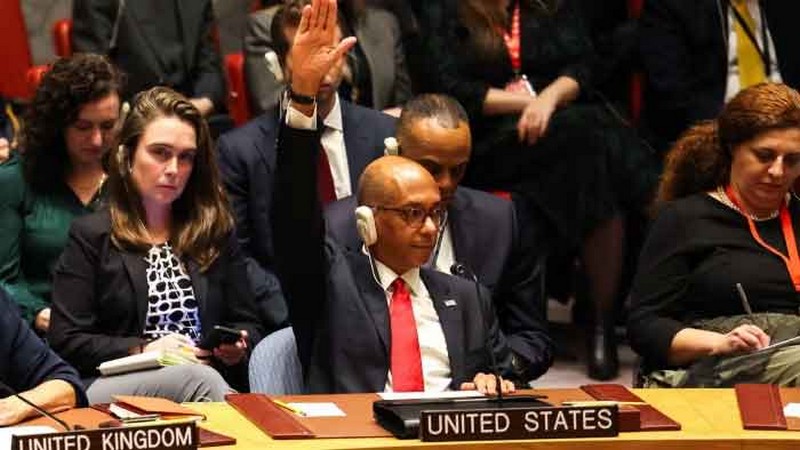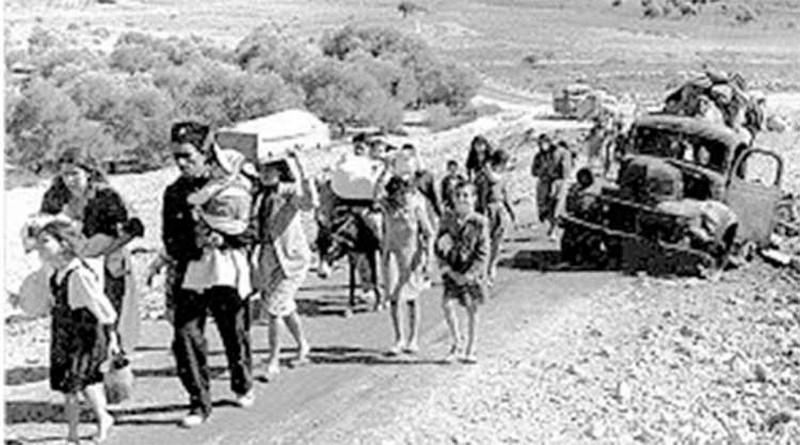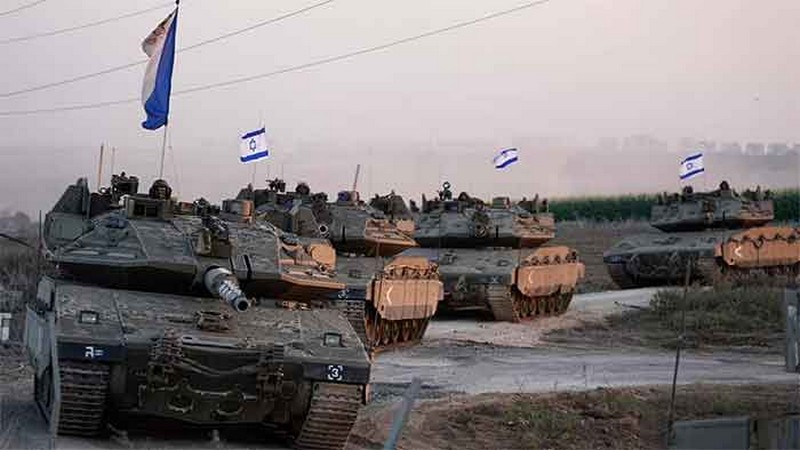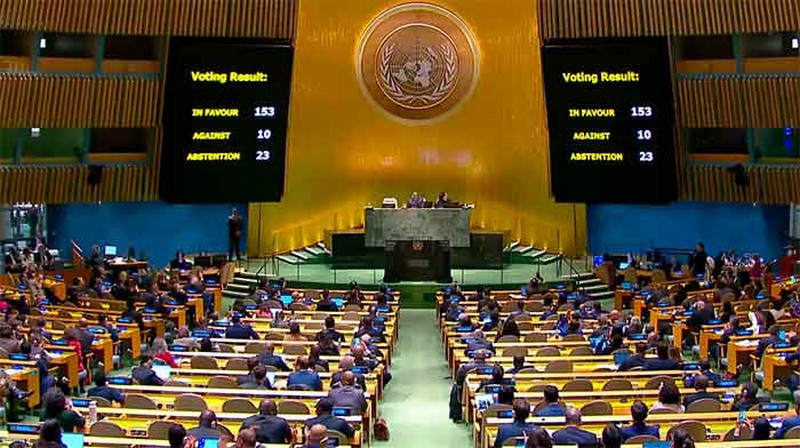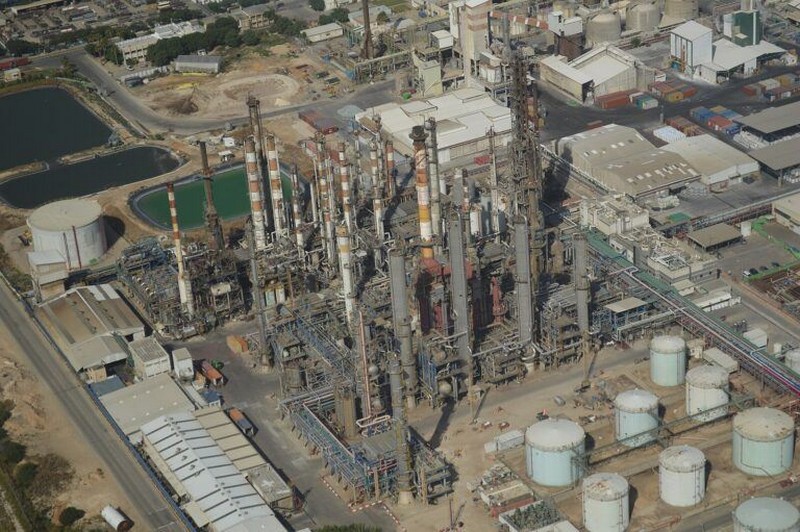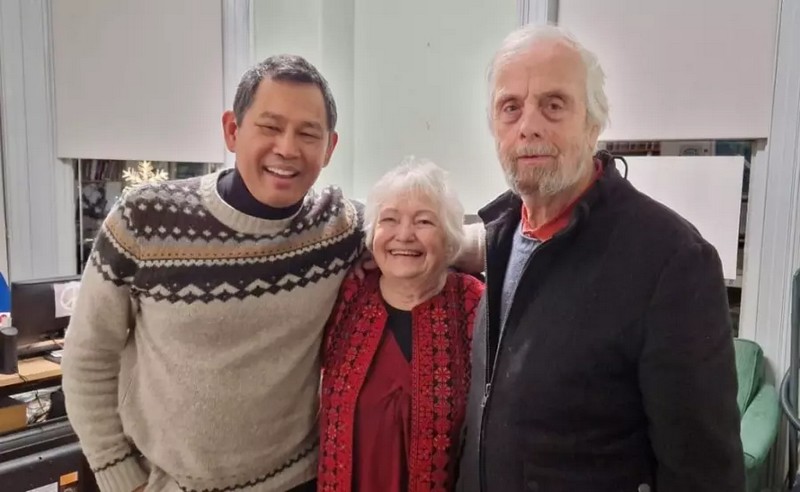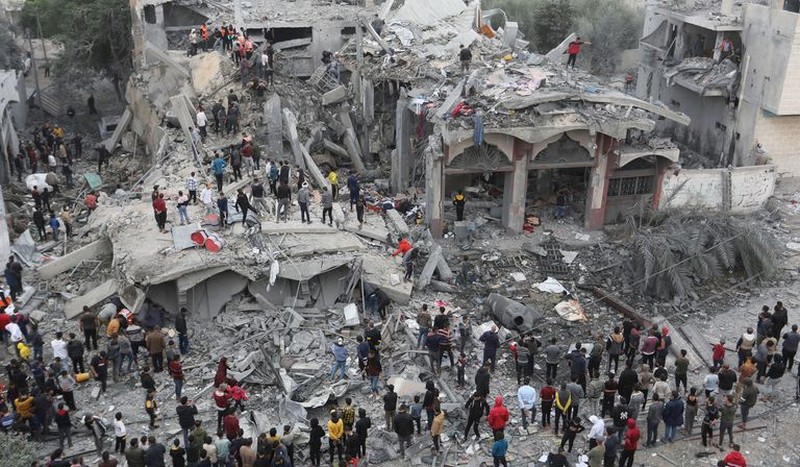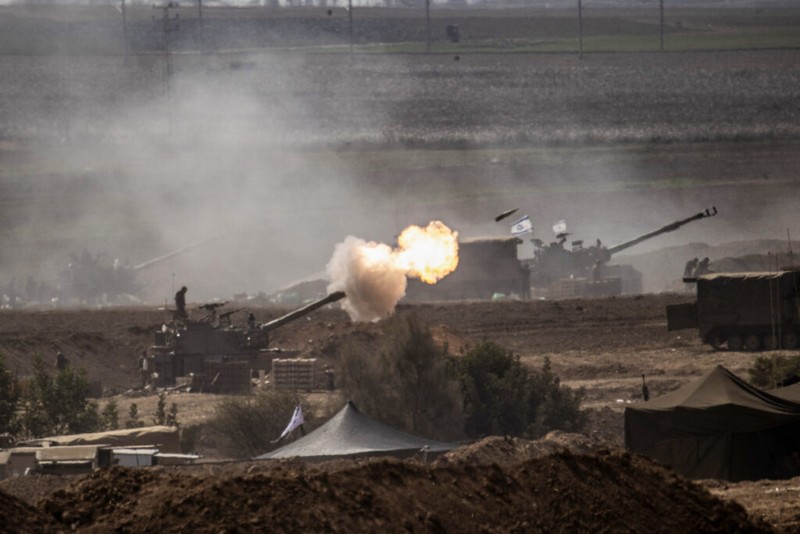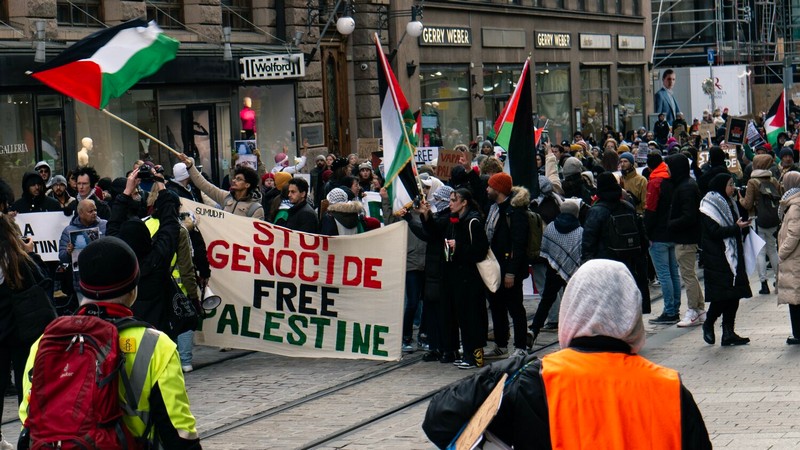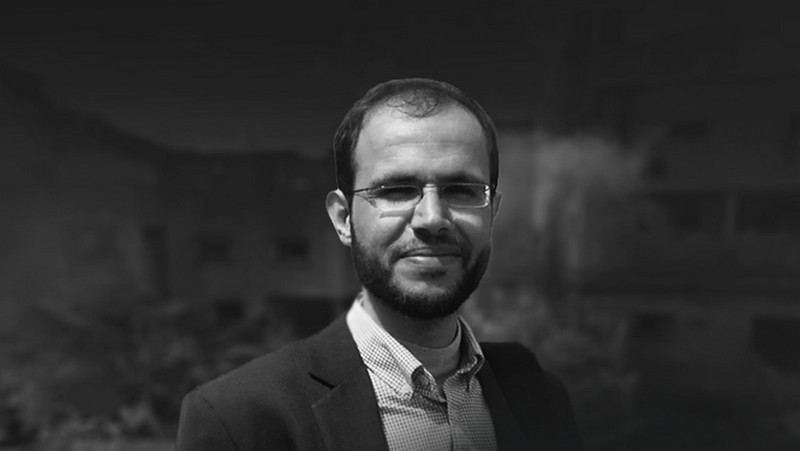By Avi Shlaim
On 7th January 2009, while Operation Cast Lead was in full swing, I wrote an article in the Guardian. “How Israel brought Gaza to the brink of humanitarian catastrophe”. This was Israel’s first major assault on the Gaza Strip after its unilateral withdrawal in 2005. Further major military offensives followed in 2012, 2014, 2021 and 2022, not counting minor flare-ups and nearly 200 dead during the border protests in 2018 known as the March of Return. By my count, the current war is the sixth serious Israeli assault on Gaza since, and by far the most lethal and destructive. And it also raises the ominous spectre of a second Palestinian Nakba.
The only way to make sense of Israel’s cruel and self-defeating wars in Gaza is through understanding the historical context. From whatever perspective one chooses to view it, the establishment of the state of Israel in May 1948 involved a monumental injustice to the Palestinians. Three quarters of a million Palestinians became refugees, and the name Palestine was wiped off the map. Israelis call it “The War of Independence”; Palestinians call it the Nakba, or the catastrophe. The most horrific event in the suffering-soaked history of the Jews was the Holocaust. In the history of the Palestinian people, the most traumatic event is the Nakba, which is not in fact a one-off event but the ongoing process of the dispossession and displacement of Palestinian people from their homeland that continues to this day, in the unspeakable horrors being visited by the Israeli Defence Forces (IDF) on Gaza.
The United Kingdom was the original sponsor of the Jewish state, going back to the Balfour declaration of 1917. But by 1948, the United States had replaced the UK as the principal backer. British officials bitterly resented American partisanship on behalf of the infant state, although they themselves had enabled and empowered the Zionist takeover of Palestine. The conditions that gave rise to the Nakba were made in Britain. Yet no British government has ever accepted any responsibility for the loss and suffering it brought upon the people of Palestine.
In the period since 1948 the western powers, led by the US, have given Israel massive moral, economic and military support, as well as diplomatic protection. The US has used its veto power in the UN Security Council 46 times to defeat resolutions that were not to Israel’s liking. America also gives Israel around $3.8bn in military aid each year, with more this year to enable Israel to sustain its military offensive in Gaza. The trouble with American support for Israel is that it is not conditional on Israeli respect for Palestinian human rights or international law. As a result, Israel gets away, literally, with murder.
In August 2005, a Likud-led government headed by Ariel Sharon staged a unilateral Israeli pull-out from Gaza, withdrawing all 8,500 settlers and destroying the houses and farms they had left behind. Hamas, the Islamic resistance movement, conducted an effective campaign to drive the Israelis out of Gaza. To the world, Sharon presented the withdrawal from Gaza as a contribution to peace. But in the year that followed, more than 12,000 settlers moved into the West Bank, consolidating Israeli control, and further reducing the scope for an independent Palestinian state.
The real purpose behind the move was to redraw the borders of Greater Israel by incorporating the main settlement blocs on the West Bank to the state of Israel. Withdrawal from Gaza was thus not a prelude to a peace deal with the Palestinian Authority, but a prelude to further Zionist expansion on the West Bank. It was a unilateral Israeli move undertaken in what was seen as the Israeli national interest. Anchored in a fundamental rejection of Palestinian national identity, the withdrawal from Gaza was part of a long-term effort to deny the Palestinian people any independent political existence on their land. This did not stop Israeli spokespersons from making the preposterous claim that by quitting they gave the Gazans a chance to turn the strip into the Singapore of the Middle East.
In December 2008, Israel launched Operation Cast Lead, in breach of a six-month ceasefire that Egypt had brokered. This was not a war in the usual sense of the word but a one-sided massacre. For 22 days, the IDF shot, shelled and bombed Hamas targets and at the same time rained death and destruction on the defenceless civilian population. In all 1,417 Gazans were killed, including 313 children, and more than 5,500 wounded. Eighty-three per cent of the casualties were civilians.
War crimes were investigated by an independent fact-finding mission appointed by the UN Human Rights Council and headed by Richard Goldstone, a distinguished South African judge who happened to be both a Jew and a Zionist. Goldstone and his team found that Hamas and the IDF had both committed violations of the laws of war. The IDF received much more severe strictures than Hamas, on account of the scale and seriousness of its violations. Hamas and other Palestinian armed groups were found guilty of launching rocket and mortar attacks with the deliberate aim of harming Israeli civilians. The Goldstone team investigated 36 incidents involving the IDF. It found 11 incidents in which Israeli soldiers launched direct attacks against civilians with lethal outcomes (in only one cause was there a possible “justifiable military objective”); seven incidents where civilians were shot leaving their homes “waving white flags and, in some of the cases, following an injunction from the Israeli forces to do so”; an attack, executed “directly and intentionally” on a hospital; numerous incidents where ambulances were prevented from attending to the severely injured; several attacks on civilian infrastructure with no military significance, such as flour mills, chicken farms, sewage works and water wells—all part of a campaign to deprive civilians of basic necessities. In the words of the report, much of this extensive damage was “not justified by military necessity and carried out unlawfully and wantonly”.
In conclusion, the 452-page report noted that while the Israeli government sought to portray its operations as essentially a response to rocket attacks in the exercise of the right to self-defence, “the Mission itself considers the plan to have been directed, at least in part, at a different target: the people of Gaza as a whole.”
Under the circumstances, the mission concluded that what occurred in just over three weeks at the end of 2008 and the beginning of 2009 was “a deliberately disproportionate attack designed to punish, humiliate and terrorize a civilian population, radically diminish its local economic capacity both to work and to provide for itself, and to force upon it an ever-increasing sense of dependency and vulnerability.” Goldstone later published an op-ed in the Washington Post, saying that while Hamas had committed war crimes (its rockets were “purposefully and indiscriminately aimed at civilian targets”), “civilians were not intentionally targeted as a matter of policy” by Israel. The other three members of the fact-finding mission said that they stood by the conclusions, which were “made after diligent, independent and objective consideration of the information related to the events within our mandate, and careful assessment of its reliability and credibility.”
Neither Israel nor Hamas was held to account nor made to pay any price for its war crimes. The Israelis resorted to a character assassination of the report’s author rather than engaging with any of its findings. Although it did not lead to any action, the Goldstone report offers a deep insight into the pattern of Israeli behaviour in Gaza in this and all subsequent operations. The absence of sanctions also explains why Israel was able to continue to act with utter impunity and, yet again, to get away literally with murder.
While committing war crimes, Israel claims to be exercising its inherent right to self-defence, and its western cheerleaders repeat this claim parrot-fashion. In this most recent and most devastating attack on Gaza, Keir Starmer, the leader of the Labour party, outdid even Joe Biden and Rishi Sunak by stating that Israel’s right to defend itself justified the denial of water, food and fuel to the civilian population. All three leaders persisted for eight weeks in their refusal to call for an immediate ceasefire, contenting themselves with feeble pleas to Israel for pauses in the fighting to allow humanitarian aid to reach the besieged civilian population.
Like most of its claims in this savage war, Israel’s claim that it is simply exercising its right of self-defence is baseless—or at least hotly disputed. Francesca Albanese, the UN Special Rapporteur on human rights in the occupied Palestinian territories, has noted that under international law this right is only relevant in the case of an armed attack by one state against another state, or if the threat comes from outside. The attack by Hamas, however, was not by a state, nor did it come from outside. It came from an area for which, under international law, Israel is still the occupying power because after its withdrawal it continued to control access to Gaza by land, sea and air. Put simply, one does not have the right to self-defence against a territory that one occupies. In this case, therefore, the self-defence clause, Article 51 of the UN Charter, has no relevance. It is the people under occupation who have under international law the right to resist, including the right to armed resistance. And the Palestinian people are in a unique position: they are the only people living under military occupation who are expected to ensure the security of their occupier.
Taken together Israel’s attacks on Gaza reflect a profoundly militaristic outlook, a stubborn refusal to explore avenues for peaceful coexistence, habitual disregard for the laws of war and international humanitarian law, and utter callousness towards enemy civilians. Israeli generals talk about their recurrent military incursions into Gaza as “mowing the grass”. By this they mean weakening Hamas, degrading its military capability and impairing its capacity to govern. This dehumanising metaphor implies a task that must be performed regularly and mechanically and with no end. It also alludes to indiscriminate slaughter of civilians and inflicting the kind of damage on civilian infrastructure that takes several years to repair.
Under this grim rubric, there is no lasting political solution: the next war is always just a matter of time. “Mowing the grass” is a chilling metaphor but it provides another clue to the deeper purpose behind Israel’s steadfast shunning of diplomacy and repeated resort to brute military force on its southern border.
The current Israeli bombardment of Gaza is a response to the Hamas attack on Saturday 7th October, or Black Saturday. This was a game changer. In the past, Hamas has fired rockets on Israel or engaged with Israeli forces inside its territory. On 7th October, Hamas and the more radical group Islamic Jihad used bulldozers to break down the fence round Gaza and went on a killing spree in the neighbouring kibbutzim and settlements, murdering about 300 soldiers and massacring more than 800 civilians, 250 of whom were at a music festival. They also captured 240 hostages, including some military personnel. The brutal, murderous attack on civilians was a war crime, and it was rightly denounced as such by international political leaders.
Whether the Hamas attack was totally unprovoked, as Israel and its friends claim, is another matter. The attack did not happen in a vacuum. The backdrop was 56 years of Israeli occupation of the Palestinian territories—the most prolonged and brutal military occupation of modern times. It constitutes daily violence against the residents of the West Bank and the Gaza Strip and a daily violation of their basic human rights.
Hamas is not a terrorist organisation pure and simple, as Israel and its western allies keep insisting. It is a political party with a military wing whose attacks on civilians constitute terrorist acts. Indeed, Hamas is more than a political party with a military wing. It is a mass social movement, a prominent part of the fabric of Palestinian society which reflects its aspiration to freedom and independence. It is the failure of the Palestine Liberation Organization (PLO) to achieve freedom and statehood that largely explains Hamas’s growing influence.
In 1993 the PLO signed the first Oslo Accord with Israel. Mutual recognition replaced mutual rejection. For the Palestinian national movement this was a historic compromise: it gave up its claim to 78 per cent of Palestine as it existed between 1920 and 1948 under the League of Nations Mandate, in the hope of gaining an independent state in the remaining 22 per cent, in the West Bank and the Gaza Strip with a capital city in east Jerusalem. But it was not to be. The Oslo Accord turned out to be not a pathway to independence but a trap.
_______________________________
Put simply, one does not have the right to self-defence against a territory that one occupies
Following the assassination of prime minister Yitzhak Rabin in 1995, the hardline nationalist party Likud came back to power under the leadership of Benjamin Netanyahu. Netanyahu has spent the rest of his political career in a relentless and so far successful effort to prevent the establishment of a Palestinian state. He has never been a partner for peace with any Palestinian faction. His game is to play them off against one another in order to frustrate the Palestinian national struggle. “Anyone who wants to thwart the establishment of a Palestinian state has to support bolstering Hamas and transferring money to Hamas,” he told his Likud colleagues in March 2019. “This is part of our strategy—to isolate the Palestinians in Gaza from the Palestinians in the West Bank.” By weakening and discrediting the moderates in the West Bank, Netanyahu inadvertently assisted the rise of Hamas.
The 1988 Hamas Charter is antisemitic, denies Israel’s right to exist and calls for a unitary Muslim state in the whole of historic Palestine, “from the river to the sea” as the slogan goes. But like the PLO before it, Hamas gradually moderated its political programme. Perhaps realising that the suicide bombings it carried out during the Second Intifada were both morally wrong and politically counter-productive, it opted for the parliamentary road to power. In January 2006, Hamas won an absolute majority in an all-Palestine election, in both Gaza and the West Bank, and proceeded to form a government. This was a more moderate, pragmatic government and it offered to negotiate a long-term ceasefire with Israel for 20, 30 or 40 years. Although the Charter was not revised until 2017, in a long series of speeches Hamas leaders indicated that they would accept a Palestinian state based on 1967 borders.
Israel refused to recognise the democratically elected Hamas government and turned down its offer of negotiations. The US and EU followed Israel’s lead and joined it in measures of economic warfare designed to undermine it. The western powers claim to believe in democracy but evidently not when the Palestinian people vote for the “wrong” party. To paraphrase Bertolt Brecht, if the Israeli and western governments are dissatisfied with the Palestinian people, they should dissolve the people and elect another.
With Saudi help, the rival Palestinian factions managed to reconcile their differences. On 8th February 2007, Fatah and Hamas signed an agreement in Mecca to stop the clashes between their forces in Gaza and to form a government of national unity. They agreed to a system of power-sharing, with independents taking the key posts of foreign affairs, finance and the interior. And they declared their readiness to negotiate a long-term ceasefire with Israel.
Israel did not like this government either and again refused to negotiate. Worse was to follow. Israel and the US secretly plotted with Fatah officials and Egyptian intelligence to undermine the national unity government. They hoped to reverse the results of the parliamentary election by encouraging Fatah to stage a coup to recapture power.
In 2008, a leak of memos from the Israel-Palestinian Authority negotiations showed that Israel and the US armed and trained the security forces of President Mahmoud Abbas with the aim of overthrowing the Hamas government. (Later, the “Palestine Papers”, a cache of 1,600 diplomatic documents leaked to Al Jazeera, would reveal more.) American neoconservatives participated in the sinister plot to instigate a Palestinian civil war. Hamas pre-empted a Fatah coup with a violent seizure of power in Gaza in June 2007. At this point the Palestinian national movement became fractured, with Fatah ruling the West Bank and Hamas ruling the Gaza Strip.
Israel responded to the Hamas move by declaring the Gaza Strip a “hostile territory”. It also enacted a series of social, economic and military measures designed to isolate and undermine Hamas. By far the most significant of these measures was the imposition of a blockade. The stated purpose of the blockade was to stop the transfer of weapons and military equipment to Hamas, but it also restricted the flow of food, fuel and medical supplies to the civilian population. One American senator was outraged to discover that pasta was on the list of proscribed items. The boycott applied not only to imports but, perversely, also to some exports from Gaza. Why prevent the export of agricultural products, fish and other non-lethal goods? It is difficult to avoid the conclusion that the hidden motive was to cripple Gaza’s economy and to inflict poverty, misery, and unemployment on its inhabitants.
In its non-military aspects, the blockade constituted a form of collective punishment that is clearly proscribed by international law. Given the scale of the suffering inflicted by the blockade on the inhabitants of the strip, if Israel were a person it could be considered guilty of “depraved indifference”, a concept in American law (its equivalent under English common law is “depraved heart”) that refers to conduct that is so wanton, so callous, so deficient in a moral sense of concern, so lacking in regard for the lives of others and so blameworthy as to warrant criminal liability.
The Israeli bombardment of Gaza since 7th October may undoubtedly be described as “depraved indifference” on account of the indescribable suffering it is inflicting on civilians. While the main enemy is Hamas, Israel keeps targeting civilian infrastructure, residential buildings, schools, mosques, hospitals, ambulances and UNRWA food depots. By the end of November, the death toll has risen to more than 15,000 dead and more than 30,000 injured—more than the total of the previous military offensives combined. An estimated 6,150 of the dead are children and 4,000 are women. Slaughter of civilians on such an industrial scale may well have taken Israel to the verge of committing genocide, “the crime of all crimes”.
There is one other aspect of this campaign that was not present in previous ones: the danger of ethnic cleansing. In previous campaigns Israel brought death and destruction to the people of Gaza but kept them cooped up in the enclave, “generously” allowing them to stay in their homes. This time Israel ordered the residents of the northern part of Gaza, nearly half the total population, to move to the southern part of the enclave. Some of those who obeyed the order were subsequently killed in Israeli air strkes. At the time of writing more than 1.8m, out of a total of 2.3m, have been internally displaced. As the Israeli military offensive moved into southern Gaza, the refugees were ordered to move out of the area to which they had fled. This amounts to a forced transfer of civilians: a war crime.
The upshot is that nowhere in Gaza is safe. Stretching the laws of war beyond credulity, Israel argues that civilians who disobey its orders and stay put in their homes in the north become legitimate military targets. In addition, Israel seems to be working on a plan to transfer people permanently from Gaza into northern Sinai. In a leaked document dated 13th October, the Israeli Ministry of Intelligence drafted a proposal for the transfer of the entire population of Gaza to Egypt’s Sinai Peninsula. The Egyptian government has expressed strong objection to the plan as well as its determination to keep the Rafah crossing firmly closed—apart from to allow some aid into Gaza during the ceasefire. But the combined pressures of the massive bombardment by the IDF and its medieval-style siege on Gaza may result in a human avalanche across the border. One thing is certain: any civilians who leave Gaza will not be allowed to return to their homes. More than half of the houses in Gaza have already been destroyed or damaged in indiscriminate Israeli bombing. So nearly half the population do not have homes to return to. No wonder that the bleak legacy of 1948 haunts the Palestinian community.
While the martyrdom of over two million innocent Palestinian civilians continues, despite the temporary ceasefire and the exchange of hostages for Palestinian prisoners, a bigger question looms: who will run what remains of the Gaza Strip after the guns fall silent? Netanyahu has declared that he wants the IDF to keep indefinite security control of the strip but no one in Israel wants to assume all the responsibilities of an occupying power again. Meanwhile, his own grip on power at home is weakening. He faces strong popular opposition for his failure to prevent the horrendous Hamas attack and, more generally, for making Israel the most dangerous place in the world for Jews to live. He is also embroiled in a corruption trial on charges—all of which he denies—including fraud, breaching public trust and accepting bribes. Politically speaking, he is a dead man walking. His days in power are numbered and there is a chance that he will end up in prison. But he is still the prime minister, and his clearly stated aim is to eradicate Hamas and to prevent it from returning to power ever again. So, who will govern the Gaza Strip after the Israeli army leaves?
____________________________________
This is not a conflict between two equal sides but between an occupying power and a subjugated population
Early signs suggest that the Americans and the EU’s foreign affairs chief, Josep Borrell, favour the return of the Palestinian Authority to Gaza. This is a totally preposterous proposition. The problem is not Hamas—which did not exist until 1987—but the Israeli occupation of the Palestinian territories. Moreover, the Hamas that committed the massacre of 7th October is far more extreme than the Hamas that won the 2006 elections and formed a national unity government. By blocking the path to peaceful political change, Israel and its western supporters are largely responsible for this regression to fundamentalist positions. Hamas may not be to their liking, but it still commands broad popular support. If an election were held today, Hamas would almost certainly beat its Fatah rival again.
And what about the sclerotic Fatah-led Palestinian Authority? It is docile, weak, corrupt and incompetent, and can barely govern the West Bank. It receives funding from the EU and to a lesser extent from the US, essentially to serve as a subcontractor for Israeli security in the area. It has shown itself to be utterly incapable of resisting the expansion of Israeli settlements, the escalation of settler violence, the slow but steady takeover of the West Bank and East Jerusalem and the flagrant encroachment by fanatical religious Zionists on the Muslim holy places in Jerusalem. Fatah also lacks legitimacy because no parliamentary elections have been held since January 2006. It has stalled on holding another parliamentary election precisely because it realises that Hamas would win.
The idea that this discredited Palestinian Authority can be imposed on the proud and long-suffering people of Gaza on the back of Israeli tanks is completely detached from reality. But it is mildly interesting, in as much as it exposes the moral and political bankruptcy of the people who espouse it. It is not for Israel or its imperialist backers to tell the people of Gaza who should govern them. If the events of the last few weeks have demonstrated anything, it is that the old narrative of Israel having a right and a duty to defend itself against a terrorist organisation, no matter the human, civilian cost, can no longer be sustained. What is happening in Gaza today is the cruel manifestation of Israeli state terrorism. Terrorism is the use of force against civilians for political ends. The cap fits and Israel must wear it. The Israeli politicians and generals who orchestrate the criminal assaults on the people of Gaza are no better than riffraff.
This ghastly war has also exposed the ruthless hypocrisy of the western leaders, their blatant double standards, their indifference to Palestinian rights and their complicity in Israel’s war crimes. Israel is an aggressive settler-colonial state and increasingly a Jewish-supremacist state intent on keeping the Palestinians in a permanent state of subordination. As long as Israel has western support, it will continue to act unilaterally, in violation of international law, in breach of a raft of UN resolutions and in defiance of the most basic norms of civilised international behaviour.
This is not a conflict between two equal sides but between an occupying power and a subjugated population. And there is absolutely no military solution to this conflict. Israel cannot have security without peace with its neighbours. A negotiated political compromise, as in Northern Ireland, is the only way forward. That settlement required external intervention, as does this one. Here, however, the US cannot serve as the sole broker because its pronounced bias in favour of Israel would make it a dishonest one. Ever since 1967, it has arrogated to itself a monopoly over the Israeli-Palestinian peace process but failed to put pressure on Israel to compromise. What is needed now is a new international coalition led by the UN which includes the US and EU but also Arab states and members of the global south. The priorities of such a coalition would be humanitarian relief, reconstruction and a long-term political plan that includes an independent Palestinian state on the Gaza Strip and the West Bank with a capital city in East Jerusalem.
Such a plan is eminently practical. All it would take to realise it is for Israel to shed its settler-colonial and Jewish-supremacist ambitions, for America to end its unconditional support for Israel, for the EU to morph from a payer to an active player, for the United Nations to overcome its self-imposed impotence, and a few similar trifles.
Correction: This article initially attributed the ironic suggestion that a government might dissolve the people and elect another to the German novelist Günther Grass. It was, in fact, made by the playwright Bertolt Brecht in his poem Die Lösung (The Solution) following the 1953 East Berlin uprising.
Avi Shlaim is a professor of international relations at Oxford University.
8 December 2023
Source: prospectmagazine.co.uk

